#vietnam national university
Text






Miss Universe Vietnam 2023 National Costume
328 notes
·
View notes
Text

#The 4 Kent State University students killed by the Ohio National Guard for protesting the Vietnam War. - 1970#topcat5#oldschool
24 notes
·
View notes
Text
THE CAMPUS CRUCIBLE OF ISLAMIC HOLY WAR -- The student mobs threaten not just the Jews but America and civilization itself
Columbia University “Gaza Solidarity Encampment”
Events at Columbia University and on other American campuses have left many people open-mouthed in shock and horror.
Overnight last night, a mob stormed Columbia’s Hamilton Hall. Masked men dressed in black used hammers and other tools to break in through the windows, barricading entry to the building with tables, chairs and a human chain. They…
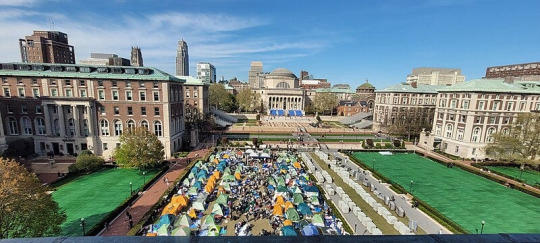
View On WordPress
#Beijing#Charles Burton#Columbia University#Conservative Party#England#Estonia#Final Solution#Fiona Hill#Gaza Solidarity Encampment#Global South#Gordon G. Chang#Hamas#Hamilton Hall#house divided#intifada#Islamic fanaticism#Jews#Joe Biden#Labor Party#London#Melanie Phillips#Minouche Shafik#Motherhoodslim Bru#Palestine#Rishi Sunak#Talinn#Tories#two-state solution#US National Security Council#Vietnam
1 note
·
View note
Text

MISS UNIVERSE VIETNAM 2022 NATIONAL COSTUME
" Ả PHÙ DUNG "

#MISS UNIVERSE#MISS COSMO#MISS UNIVERSE VIETNAM#NATIONAL COSTUME#FLOWERS#ART#COUTURE#FASHION#VIETNAM
1 note
·
View note
Text
President Biden’s Inspiring Praise of John McCain and Criticism of Donald Trump and MAGA
On September 28, 2023, President Joe Biden was in Tempe, Arizona to announce a major federal grant to the state of Arizona to help design and build a new McCain National Library at Arizona State University. The President’s remarks on that occasion honored his deceased friend, John McCain, followed by the President’s blistering attack on Donald Trump and his Make America Great Again (MAGA)…
View On WordPress
#American cemetery near Paris (France)#Arizona State University (ASU)#Donald J. Trump#Hanoi (Vietnam)#John McCaine#Make America Great Again (MAGA) movement#Mark Milley (former Chairman of Joint Chiefs of Staff)#McCain National Library#President Joe Biden#Republican Party#retribution#U.S. Bill of Rights#U.S. CivilService (Schedule F)#U.S. Constitution#U.S. Declaration of Independence
0 notes
Text
hey um are you guys seeing that the government is threatening to bring in the national guard at Columbia?
for those of you who don’t know, there were protests in the 1970s on us college campuses against the Vietnam War. At Kent State University, they called in the national guard, who massacred the protesting students.
This is an eerily similar chain of events. It’s mind-boggling that the US is so committed to imperialism that they would rather kill their own citizens than stop killing foreigners. More than that, that they would do so multiple times over, decades apart.
I hope I’m wrong and that the students will be okay. My thoughts are with them, just as my thoughts are always with the people of Palestine.
🍉🍉🍉🍉🍉
3K notes
·
View notes
Text
Measuring purely by confirmed kills, the worst mass murderer ever executed by the United States was the white supremacist terrorist Timothy McVeigh. On April 19, 1995, McVeigh detonated a massive bomb at the Murrah federal building in Oklahoma City, killing 168 people, including 19 children. The government killed McVeigh by lethal injection in June 2001. Whatever hesitation a state execution provokes, even over a man such as McVeigh — necessary questions about the legitimacy of killing even an unrepentant soldier of white supremacy — his death provided a measure of closure to the mother of one of his victims. “It’s a period at the end of a sentence,” said Kathleen Treanor, whose 4-year old McVeigh killed.
McVeigh, who in his own psychotic way thought he was saving America, never remotely killed on the scale of Kissinger, the most revered American grand strategist of the second half of the 20th century.
The Yale University historian Greg Grandin, author of the biography Kissinger’s Shadow, estimates that Kissinger’s actions from 1969 through 1976, a period of eight brief years when Kissinger made Richard Nixon’s and then Gerald Ford’s foreign policy as national security adviser and secretary of state, meant the end of between three and four million people. That includes “crimes of commission,” he explained, as in Cambodia and Chile, and omission, like greenlighting Indonesia’s bloodshed in East Timor; Pakistan’s bloodshed in Bangladesh; and the inauguration of an American tradition of using and then abandoning the Kurds.
No infamy will find Kissinger on a day like today. Instead, in a demonstration of why he was able to kill so many people and get away with it, the day of his passage will be a solemn one in Congress and — shamefully, since Kissinger had reporters like CBS’ Marvin Kalb and The New York Times’ Hendrick Smith wiretapped — newsrooms. Kissinger, a refugee from the Nazis who became a pedigreed member of the “Eastern Establishment” Nixon hated, was a practitioner of American greatness, and so the press lionized him as the cold-blooded genius who restored America’s prestige from the agony of Vietnam.
Not once in the half-century that followed Kissinger’s departure from power did the millions the United States killed matter for his reputation, except to confirm a ruthlessness that pundits occasionally find thrilling. America, like every empire, champions its state murderers. The only time I was ever in the same room as Henry Kissinger was at a 2015 national-security conference at West Point. He was surrounded by fawning Army officers and ex-officials basking in the presence of a statesman.
2K notes
·
View notes
Note
can i ask you about the 1970s?
Have you ever heard of the Kent State Shooting? Basically in 1970, The Governor of Ohio sent to Ohio National Guard to end anti war student protests over the expansion of the vietnam war into Cambodia which were taking place at Kent State University due to fears that a student strike would lead to violent revolutionaries taking control of the city of Kent and by the 4th day of protests which was may 4th, the protests and tensions had escalated to such a degree that the university and town both decided to shut down the student protests, but when the protests happened anyways the National Guard fired tear gas from a grenade launcher into the crowd and when that didn't dispell the protests, the national guard began to advance on the protestors leading to 10 to 50 of the protestors throwing rocks at the national guard leading to more throwing of tear gas at the crowd. Later due to unknown causes that lead up to it, at least 29 of the 77 the national guard members present shot their 66 rounds into both the protestors and students not involved in the protests who were passing by, injuring 9 students and killing 4.
691 notes
·
View notes
Text
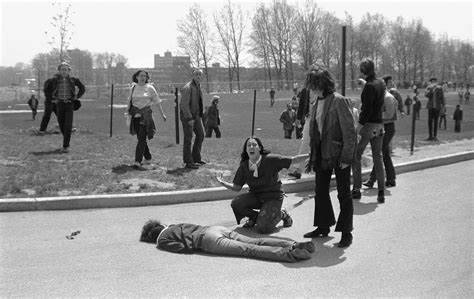

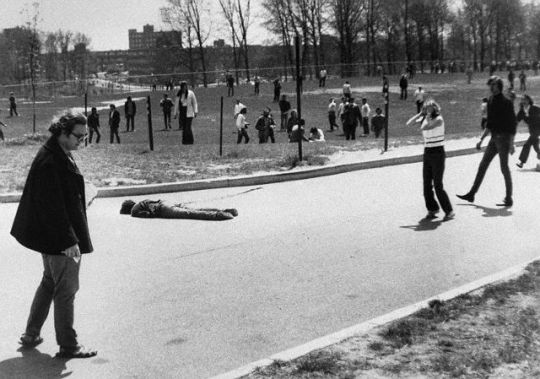
On This Day: Kent State shootings leave 4 students dead!
Four Kent State University students were killed and nine were injured on May 4, 1970, when members of the Ohio National Guard opened fire on a crowd gathered to protest the Vietnam War. The tragedy was a watershed moment for a nation divided by the conflict in Southeast Asia. In its immediate aftermath, a student-led strike forced the temporary closure of colleges and universities across the country. Some political observers believe the events of that day in northeast Ohio tilted public opinion against the war and may have contributed to the downfall of President Richard Nixon.
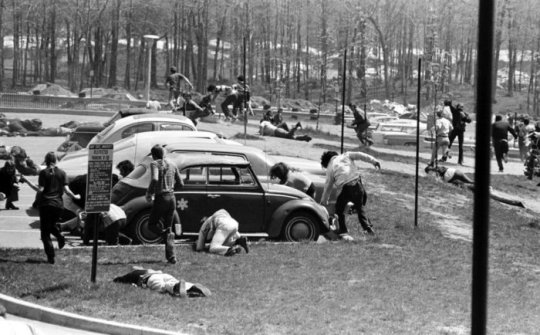
Students dive to the ground as the National Guard fires on faculty and students May 4, 1970, to protest the war in Vietnam. File Photo courtesy of Kent State University Archives
The Kent State Shootings
“… Give Peace a Chance (iastate.edu)
On This Day, May 4: Kent State shootings leave 4 students dead - UPI.com
#فلسطين#امريكا#الشرطة#vietnam war#kent state#university#student protest#UCLA#columbia university#on this day#MAY#may the fourth be with you#the amazing digital circus#HISTORY#1970S#vintage#1970s history#USA#richard nixon#KENT STATE#university protests#protests#columbia#palestine protest#boycott israel#gaza#Palestine#free gaza#free palestine#art
415 notes
·
View notes
Text
On May 4, 1970, during an anti-war protest opposing the war in Vietnam, sprung from the expansion into Cambodia, four students were killed, and nine were harmed by the Ohio National Guard at Kent State University campus. The students were unarmed. Not one of the shooters went to jail. A national moment that sparked even more anti-war protests and general condemnation for the american state.
Anti-war protests and support have historically been villanised. Under the Vietnam War, opposers were called commies. Under the 'war against terror', opposers were called terrorist sympathisers. When the US went into Iraq, opposers were called traitors. All were known as pushing anti-America sentiment—being unpatriotic—just as we hear being slung around today: opposers are terrorist-supporters, antisemitic and nazis. Creating rhetoric demonising demonstrators is favourable for the state's image and affairs, "they are the mad ones, so PLEASE stop criticising our war, our invasion, and our genocide". Patterned hindsight is why we must not forget that this is a historical tactic, which will only work if we forget. Hold them accountable for this genocide; in the future, they will try to soften their current actions out of embarrassment. It won't work.
The around 300 Kent State University students' demands lay as an echo over those we hear yelled from campuses all over the US this week. Student protests and organising have always been important measures in combating government actions and to all who are attending these protests: the world is seeing you; your demands are echoing through nation borders. I am proud of my fellow students and have, myself, been inspired to look into actions I can partake in at my own university. Thank you. Be safe. Free Palestine.
#kent state university#kent state#police brutality#campus protests#university protests#vietnam war#free palestine#palestine#politics#usa#fuck america#gaza strip
409 notes
·
View notes
Quote
Student debt also largely didn’t exist in America before the Reagan Revolution. It was created by Republicans here in the 1980s — intentionally — and if we can overcome Republican opposition, we can intentionally end it here and join the rest of the world in once again benefiting from an educated populace.
Forty years on from the Reagan Revolution, student debt has crippled three generations of young Americans: over 44 million people carry the burden, totaling a $2+ trillion drag on our economy that benefits nobody except the banks earning interest on the debt and the politicians they pay off.
But that doesn’t begin to describe the damage student debt has done to America since Reagan, in his first year as governor of California, ended free tuition at the University of California and cut state aid to that college system by 20 percent across-the-board.
After having destroyed low income Californians’ ability to get a college education in the 1970s, Reagan then took his anti-education program national as president in 1981.
When asked why he’d taken a meat-axe to higher education and was pricing college out of the reach of most Americans, he said, much like Ted Cruz might today, that college students were “too liberal” and America “should not subsidize intellectual curiosity.”
It was the 1980s version of today’s “war on woke”: Reagan hated college students.
On May 1, 1970, Governor Reagan announced that students protesting the Vietnam war across America were “brats,” “freaks” and “cowardly fascists,” adding, as The New York Times noted at the time:
“If it takes a bloodbath, let’s get it over with. No more appeasement!”
Four days later four were dead at Kent State, having been murdered by National Guard riflemen using live ammunition against anti-war protesters.
Before Reagan became president, states paid 65 percent of the costs of colleges, and federal aid covered another 15 or so percent, leaving students to cover the remaining 20 percent with their tuition payments.
It’s why when I attended college in the late 1960s — before Reagan — I could pay my tuition working a weekend job as a DJ at a local radio station and washing dishes at Bob’s Big Boy restaurant on Trowbridge Road in East Lansing.
The real reason Republicans oppose efforts to cancel student debt - Raw Story
431 notes
·
View notes
Video
Miss Universe Vietnam 2022 National Costume: CHIẾU CÀ MAU
Inspired by the beauty of culture and people in the mat weaving village, "Chiếu Cà Mau” carries the story of children. peaceful, simple people in the southernmost part of the country. The new scented mats have reflected the colors of luck and happiness, bringing hope to light up ambitions for a bright future.
The simple, idyllic mat has yet been attached to so many people, through many generations and still exists until today. And now, from a traditional handicraft village of Vietnam, "Chiếu Cà Mau" has been transformed into a masterpiece of national costume representing Vietnam at the Miss Universe arena.
As the excellent work that won the first prize of the National Custome Contest, "Chiếu Cà Mau” by designer Nguyễn Quốc Việt officially accompanies Miss Ngoc Chau to the Miss Universe arena.
#miss universe#miss universe vietnam#national costume#national costume contest#pageant#vietnam#tw flashing#i still can't find a good full length picture but at least there's a video
86 notes
·
View notes
Note
do you know any texts on the connection between fascism/the right and cleanliness/hygiene (purity) rhetoric? anything that goes a bit in depth on the topic?
Getting Under Our Skin: The Cultural and Social History of Vermin (2021). Sarasohn, Lisa Tunick. ISBN: 9781421441382
Dirt: New Geographies of Cleanliness and Contamination (2007). Campkin, Ben & Cox, Rosie (Eds.). ISBN: 9781845116729
The Sanitation of Brazil: Nation, State, and Public Health, 1889-1930 (2016). Hochman, Gilberto. ISBN: 9780252099052
Clean and White: A History of Environmental Racism in the United States (2015). Zimring, Carl A. ISBN: 9781479826940
Colonial Pathologies: American Tropical Medicine, Race, and Hygiene in the Phillipines (2006). Anderson, Warwick H. ISBN: 0822338041
Bacteriology in British India: Laboratory Medicine and the Tropics (2017). Chakrabarti, Pratik. ISBN: 9781580465908
The Great Hanoi Rat Hunt: Empire, Disease, and Modernity in French Colonial Vietnam (2018). Vann, Michael G. & Clarke, Liz. ISBN: 9780190602697
Soap and Water: Cleanliness, Dirt and the Working Classes in Victorian and Edwardian Britain (2010). Kelley, Victoria. ISBN: 9781848850521
Contagion: Disease, government, and the “social question” in 19th-century France (1999). Aisenberg, Andrew R.
Rome, Pollution, and Propriety: Dirt, Disease, and Hygiene in the Eternal City from Antiquity to Modernity (2012). Bradley, Mark & Stow, Kenneth R. ISBN: 9781107014435
Sanitizing South Africa: Race, Racism and Germs in the Making of the Apartheid State, 1880-1980 (2015). Fabio Terence Palmi Zoia. PhD. Dissertation, Indiana University. Available from ProQuest Dissertations & Theses Global. (1682266398)
there are also a few theoretical texts in social / cultural anthropology that will be frequent touchstones here, including norbert elias's 'the civilising process' (first published 1939) and mary douglas's 'purity and danger' (1966). i don't honestly think it's worth it or necessary to read these directly, both because they're dated in certain ways and because i think the historical studies are generally more useful. but you will probably notice these two texts & a handful of others repeatedly cropping up in introductory footnotes on this topic.
926 notes
·
View notes
Text



“Name me a single objective we’ve ever set out to accomplish that we’ve failed on. Name me one, in all of our history. Not one!”
-President Joe Biden, August 16, 2023
Joe Biden in one of his now accustomed angry “get off my grass” moods dared the press to find just one of his policies/objectives that has not worked. Silence followed.
Perhaps it was polite to say nothing, given even the media knows almost every enacted Biden policy has failed.
Here is a summation of what he should instead apologize for.
Biden in late summer 2021 sought a 20th anniversary celebration of 9/11 and the 2001 subsequent invasion of Afghanistan. He wished to be the landmark president that yanked everyone out of Afghanistan after 20 years in country. But the result was the greatest military humiliation of the United States since the flight from Vietnam in 1975.
Consider the ripples of Biden’s disaster. U.S. deterrence was crippled worldwide. China, Russia, Iran, and North Korea almost immediately began to bluster or return to their chronic harassment of U.S. and allied ships and planes. We left thousands of allied Afghans to face Taliban retribution, along with some Western contractors.
Biden abandoned a $1 billion embassy, and a $300 million remodeled Bagram airbase strategically located not far from China and Russia, and easily defensible. Perhaps $50 billion in U.S. weaponry and supplies were abandoned and now find their way into the international terrorist mart.
All our pride flags, our multimillion gender studies programs at Kabul University, and our George Floyd murals did not just come to naught, but were replaced by the Taliban’s anti-homosexual campaigns, burkas, and detestation of any trace of American popular culture.
Vladimir Putin sized up the skedaddle. He collated it with Biden’s unhinged quip that he would not get too excited if Putin just staged a “minor” invasion of Ukraine. He remembered Biden’s earlier request to Putin to modulate Russian hacking to exempt a few humanitarian American institutions. Then Russia concluded of our shaky Commander-in-Chief that he either did not care or could do nothing about another Russian invasion.
The result so far is more than 500,000 dead and wounded in the war, a Verdun-stand-off along with fortified lines, the steady depletion of our munitions and weapon stocks, and a new China/Russia/Iran/North Korean axis, with wink and nod assistance from NATO Turkey.
Biden blew up the Abraham accords, nudged Saudi Arabia and the Gulf States over to the dark side of Iran, China, and Russia. He humiliated the U.S. on the eve of the midterms by callously begging the likes of Iran, Venezuela, Russia, and Saudi Arabia to pump more oil that he had damned as unclean at home and cut back its production. In Bidenomics, instead of producing oil, the president begs autocracies to export it to us at high prices while he drains the nation’s strategic petroleum reserve for short-term political advantage.
Biden deliberately alienated Israel by openly interfering in its domestic politics. He pursued the crackpot Iran Deal while his special Iranian envoy was removed for disclosing classified information.
No one can explain why Biden ignored the Chinese balloon espionage caper, kept mum about the engineered Covid virus that escaped the Wuhan lab, said not a word about a Chinese biolab discovered in rural California, and had his envoys either bow before Chinese leaders or take their insults in silence—other than he is either cognitively challenged or leveraged by his decade-long grifting partnership with his son Hunter.
Yet another Biden’s legacy will be erasing the southern border and with it, U.S. immigration law. Over seven million aliens simply crossed into the U.S. illegally with Biden’s tacit sanction—without audits, background checks, vaccinations, and COVID testing, much less English fluency, skills, or high-school diplomas.
Biden’s only immigration accomplishment was to render the entire illegal sanctuary city movement a cruel joke. Given the flood, mostly rich urban and vacation home dwellers made it very clear that while they fully support millions swarming into poor Latino communities of southern Texas and Arizona, they do not want any illegal aliens fouling their carefully cultivated nests.
Biden is mum about the 100,000 fentanyl deaths from cartel-imported and Chinese-supplied drugs across his open border. He seems to like the idea that Mexican President Obrador periodically mouths off, ordering his vast expatriate community to vote Democratic and against Trump.
Despite all the pseudo-blue collar dissimulation about Old Joe Biden from Scranton, he has little empathy for the working classes. Indeed, he derides them as chumps and dregs, urges miners to learn coding as the world covets their coal, and studiously avoids getting anywhere near the toxic mess in East Palestine, Ohio, or so far the moonscape on Maui.
Bidenomics is a synonym for printing up to $6 billion dollars at precisely the time post-Covid consumer demand was soaring, while previously dormant supply chains were months behind rebooting production and transportation. Biden is on track to increase the national debt more than any one-term president.
In Biden’s weird logic, if he raised the price of energy, gasoline, and key food staples 20-30 percent since his inauguration without a commensurate rise in wages, and then saw the worst inflation in 40 years occasionally decline from record highs one month to the next, then he “beat inflation.”
But the reason why more than 60 percent of the nation has no confidence in Bidenomics is because it destroyed their household budgets. Gas is nearly twice what it was in January 2021. Interest rates have about tripled. Key staple foods are often twice as costly—meat, vegetables, and fruits especially.
Biden has ended through his weaponized Attorney General Merrick Garland the age-old American commitment to equal justice under the law. The FBI, DOJ, CIA, and IRS are hopelessly politically compromised. Many of their bureaucrats serve as retrieval agents for lost Biden family incriminating laptops, diaries, and guns. In sum, Biden criminalized opposing political views.
Biden has unleashed the administrative state for the first time in history to destroy the Republican primary front runner and his likely opponent. His legacy will be the corruption of U.S. jurisprudence and the obliteration of the American reputation for transparent permanent government that should be always above politics, bribery, and corruption.
If in the future, an on-the-make conservative prosecutor in West Virginia, Utah, or Mississippi wishes to make a national name, then he has ample precedent to indict a Democrat President for receiving bad legal advice, questioning the integrity of an election, or using social media to express doubt that the new non-Election-Day balloting was on the up-and-up, or supposedly overvaluing his real estate.
The Biden family’s decade-long family grifting will likely expose Joe Biden as the first president in U.S. history who fitted precisely the Constitution’s definition of impeachment and removal—given his “high crimes and misdemeanors” appear “bribery”-related. If further evidence shows he altered U.S. foreign policy in accordance with the wishes from his benefactors in Ukraine, China, or Romania, then he committed constitutionally-defined “treason” as well.
Defunding the police, and pandemics of exempted looting, shoplifting, smashing, and grabbing, and carjacking merit no administrative attention. Nor does the ongoing systematic destruction of our blue bicoastal cities, Los Angeles, New York, Portland, San Francisco, Seattle, and Washington, D.C. All that, along with the disasters in East Palestine or Maui are out of sight, out of mind from a day at the beach at Biden’s mysteriously purchased nearly 6,000 square-foot beachfront mansion.
Biden ran on Barack Obama-like 2004 rhetoric (“Well, I say to them tonight, there is not a liberal America and a conservative America — there is the United States of America).”
And like Obama, he used that ecumenical sophistry to gain office only to divide further the U.S. No sooner than he was elected, we began hearing from the great unifier eerie screaming harangues about “semi-fascists” and “ultra-MAGA” dangerous zealots, replete with red-and black Phantom of the Opera backdrops.
What followed the unifying rhetoric was often amnesties and exemptions for violent offenders during the 120 days of rioting, looting, killing, and attacks on police officers in summer 2020. In contrast, his administration lied when it alleged that numerous officers had died at the hands of the January 6 rioters. In addition, the Biden administration mandated long-term incarceration of many who committed no illegal act other than acting like buffoons and “illegally parading.”
The message was exemptions for torching a federal courthouse, a police precinct, or historic church or attempting to break into the White House grounds to get a president and his family—but long prison terms for wearing cow horns, a fur vest, and trespassing peacefully like a lost fool in the Capitol.
Finally, Biden’s most glaring failure was simply being unpresidential. He snaps at reporters, and shouts at importune times. He can no longer read off a big-print teleprompter. Even before a global audience, he cannot kick his lifelong creepy habit of turkey-gobbling on children necks, blowing into their ears and hair of young girls, and squeezing women far too long and far too hard.
His frailty redefined American presidential campaigning as basement seclusion and outsourcing propaganda to the media. And his disabilities only intensified during his presidency. Biden begins his day late and quits early. He has recalibrated the presidency as a 5-hour, 3-day a week job.
If Trump was the great exaggerator, Biden is our foremost liar. Little in his biography can be fully believed. He lies about everything from his train rides to the death of his son to his relationship with Biden-family foreign collaborators, to vaccinations to the economy. Anytime Biden mentions places visited, miles flown, or rails ridden, he is likely lying.
Biden continues with impunity because the media feels that a mentally challenged fabulist is preferable to Donald Trump and so contextualizes or ignores his falsehoods. Never has a U.S. president fallen and stumbled or gotten lost on stage so frequently—or been a single small trip away from incapacity.
So, yes, Biden’s initiatives have succeeded only in the sense of becoming successfully enacted—and therefore nearly destroying the country.
538 notes
·
View notes
Text
Full Article Text:
The United Kingdom is facing dire food shortages, forcing prices to skyrocket, and experts predict this is only the beginning.
What's happening?
According to a report by The Guardian, extreme weather is wreaking havoc on crops across the region. England experienced more rainfall during the past 18 months than it has over any 18-month period since record-keeping began in 1836.
Because the rain hasn't stopped, many farmers have been unable to get crops such as potatoes, carrots, and wheat into the ground. "Usually, you get rain but there will be pockets of dry weather for two or three weeks at a time to do the planting. That simply hasn't happened," farmer Tom Allen-Stevens told The Guardian.
Farmers have also planted fewer potatoes, opting for less weather-dependent and financially secure crops. At the same time, many of the potatoes that have been planted are rotting in the ground.
"There is a concern that we won't ever have the volumes [of potatoes] we had in the past in the future," British Growers Association CEO Jack Ward told The Guardian. "We are not in a good position and it is 100% not sustainable," Ward added.
Why is it important?
English farmers aren't alone — people are struggling to grow crops worldwide because of extreme weather.
Dry weather in Brazil and heavy rain in Vietnam have farmers concerned about pepper production. Severe drought in Spain and record-breaking rain and snowfall in California have made it difficult for farmers to cultivate olives for olive oil. El Niño and rising temperatures cut Peru's blueberry yield in half last year. Everyone's favorite drinks — coffee, beer, and wine — have all been impacted by extreme weather.
According to an ABC News report, the strain on the agriculture industry will likely continue to cause food prices to soar.
If these were just isolated events, farmers could more easily adapt — bad growing seasons are nothing new. The problem is that rising temperatures are directly linked to the increasing amount of gases such as carbon dioxide and methane in the atmosphere.
Since the start of the Industrial Revolution, humans have burned dirty energy sources such as coal, oil, and gas, which release a significant amount of those gases. Our climate is changing so drastically that the 10 warmest years since 1850 have all occurred in the last decade.
"As climate change worsens, the threat to our food supply chains — both at home and overseas — will grow," Energy and Climate Intelligence Unit analyst Amber Sawyer told The Guardian.
What can we do about it?
"Fortunately, we know many ways we can make the food system more resilient while reducing food emissions. The biggest opportunity in high-income nations is a reduction in meat consumption and exploration of more plants in our diets," said Dr. Paul Behrens, an associate professor of environmental change at Leiden University in the Netherlands.
If we replace a quarter of our meat consumption with vegetables, we could cut around 100 million tons of air pollution yearly. It may seem strange to suggest eating more vegetables with the decline in crop production. However, reducing the land and water used for animal agriculture and diverting those resources to growing more produce would drastically help the declining food supply.
Growing our own food is also a great way to reduce our reliance on store-bought produce, and it can save you hundreds of dollars a year at the grocery store.
121 notes
·
View notes
Text
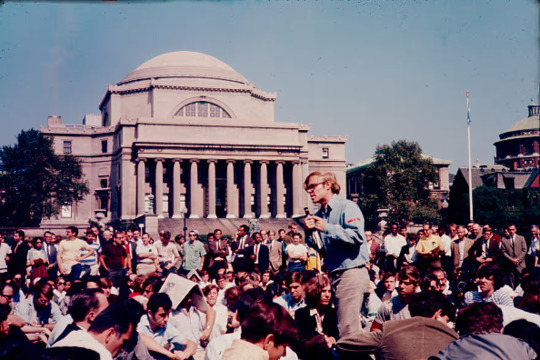
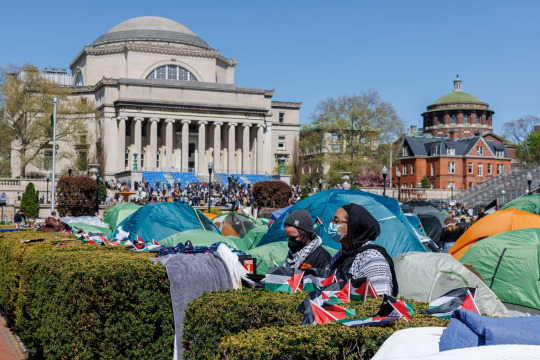
In 1968, Stein was one of 700 students arrested at Columbia during protests targeting both the university’s ties to the US military apparatus at the height of the Vietnam war, and the college’s plan to build a segregated gym, at the height of the civil rights movement. “This was really a crisis moment,” Stein, 78, recalls. “Students were taking a moral stand. We were ready to risk our careers, and our lives and our futures, and take a leap into the unknown and say, ‘No. We are not going to budge.’”
[...] But what hope – or cautions – do these older protest movements, and protesters, offer in the present?
[...]Observing the new protests from the outside, Stein found a great deal to admire. “I think the students have been incredibly organized,” she says. “And, let me say, completely peaceful.”
[...] The Pakistani British political activist and intellectual Tariq Ali, 80, is similarly buoyed by the images of the protests he sees on TV and social media. “I feel very joyous,” he says. “It does bring back memories.”
[...] “The most important thing,” he says, “is how important this is for the Palestinians, and how they must be feeling in Gaza and the West Bank,” he says. “That’s what we used to think when we were marching in the 60s. ‘Does it have any effect at all? Do the Vietnamese watching us know what we’re doing?’ And they did! Later on we found out that many images of demonstrations … were shown to the Vietnamese people, and to the Vietnamese army.”
Thanks to social media and 24-hour news coverage, US students haven’t had to wait to see thank-you notes from Palestinians in Gaza.
Stein sees a similar comparison, in terms of how Vietnam and Palestine serve to exemplify, and crystallize, the more egregious excesses of US (and US-backed) military campaigning. “In my day, the moral issue of our time was Vietnam,” she recalls. “When I look at the students today, I think they’ve identified the ongoing genocide in Gaza, and the US’s role in arming and providing high-speed, high-scale weaponry, 1,000-pound bombs, for Israel, and they’re saying: ‘Business as usual can’t go on.’”
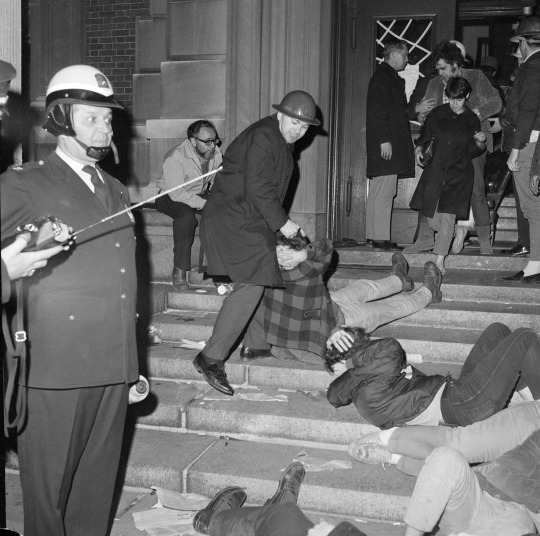
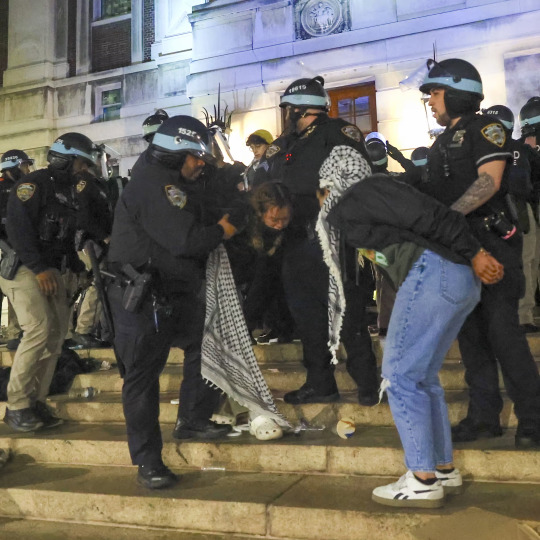
For other veterans of the American left, the direct comparison between the Vietnam war and the military incursion in Gaza feels a bit incomplete. The American writer John B Judis – a Berkeley grad, frontliner at Vietnam war protests, and self-identifying democratic socialist – thinks the current situation is more complicated. “I welcome protests against America’s unconditional support [for Israel],” Judis says. “For me, it’s a question of whether the student protests are an effective way of doing that.”
[...] For Judis, the current movements evoke some of the missteps of earlier protests. “They recall, to some extent, the errors that the anti-imperialist wing of the New Left made in the 60s,” he says. “They’re not focused on ending America’s unconditional aid to Israel, but on these broader goals: free Palestine. Or they want to see a secular democracy of Palestine, which I think is really unfeasible. It’s not going to happen. The Israelis are not going to allow that to happen.”
[...] Judis argues that such broadly anti-imperial aims are not only unrealistic, but also indulge a certain tendency toward “romanticizing foreign governments” that has long dogged American leftism. He cites previous generations’ glorification of Fidel Castro, Mao Zedong, and Ho Chi Minh as examples.
[...] “The idea that this is too controversial, or will produce such a conflagration of ideas, is exactly the opposite of what the university is for,” Stein says. “And students who want to discuss it have been silenced. I think that has led to frustration, and anger, among the students. Protest does have a history on campus. But in this case, the protests were necessary to even get a conversation started about what’s happening in Gaza.”
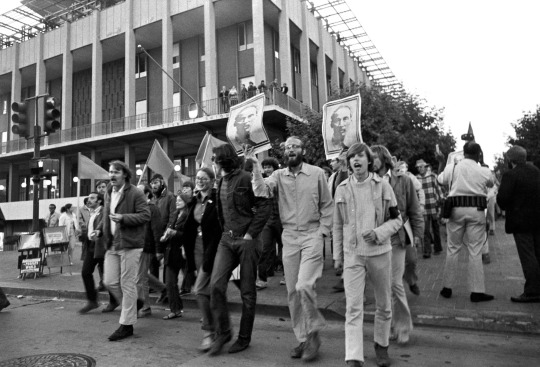
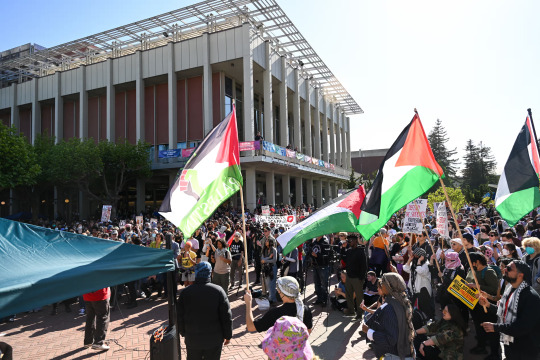
[...] A man of Quaker and Jewish upbringing, Isserman condemns Israel’s inordinate response to Hamas’s aggression, while maintaining that the nation has a right to exist, and to defend itself “within limits that it too often violates”. And he has a hard time watching socialists (new and old) throw their lot in with fundamentalist groups. “These people are not our friends,” he says of Hamas. “You’re talking about a rightwing fundamentalist sect; a murderous sect. [The protesters] are making a very old error. Just in a new time.”
The New York University historian Michael Koncewicz notes that the anti-Vietnam war movement drew a broader coalition: not just progressive college students and American communists but liberals of all stripes. “There were people who viewed the Vietnam war as a tragic mistake that we needed to end. And then there were those who viewed it as a criminal act perpetrated by the American empire,” he says. “Those two sides were both on the streets.” That said, in his research and reporting, Koncewicz has found broad levels of support for the current movement among older radicals. “This is something that not a lot of young New Leftists had in the 60s and 70s: actual support from elders.”
[...] Historically, the US role in foreign conflicts hasn’t really moved the needle in domestic electoral politics. “We’re in uncharted territory here,” saysKoncewicz, “in terms of trying to figure out whether a foreign policy crisis will actually impact an American election. Because very few do. Most times, these things don’t matter.”
But the recent action across campuses speaks to a more intimate front emerging in the conflict. Another key distinction between the wars in Gaza and Vietnam is that the latter also took the form of a domestic crisis, with the mandatory military draft drawing American families (and voters) into this far-off conflict much more directly. The campus protests could have a similar effect. Images of militarized police forces sweeping through campus quads, rounding up students, professors and other assembled sympathizers, may win hearts and minds more than the images of a war being waged halfway across the world. “We saw that in the 60s and 70s as well,” says Tariq Ali of the police presence on campuses. “This is nothing new. What is interesting is they’re not being called by the governors of the states concerned [as in the 60s], but by the heads of the universities.”
The disgust at the authoritarian response to these protests seems to run across the various splinters fracturing the contemporary socialist left. “I have some criticisms with the encampments,” Isserman says. “But when you send in the cops, then my sympathy is with the students. That’s a separate issue from whether they could be more effective if they moderated their stance.”
Eleanor Stein hopes that, if history is any precedent, the reaction to these protests may be the thing that shifts public opinion. Like the draft, images of students being rounded up in paddy wagons wheeled on to college campuses may have a way of bringing the war home, and moving the needle of public opinion.
“In 1968, Columbia was quite divided about the protests,” she says. “But once we were all arrested, and the police were occupying our campus, the tide of opinion shifted dramatically in our favour. And that’s what you see happening now. This is how people learn … It represents a tremendous force for change. And without it, I shudder to think of where we would be.”
(x)
77 notes
·
View notes